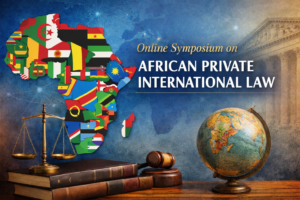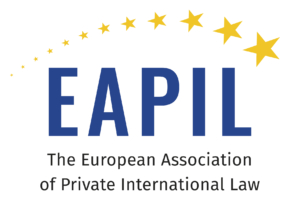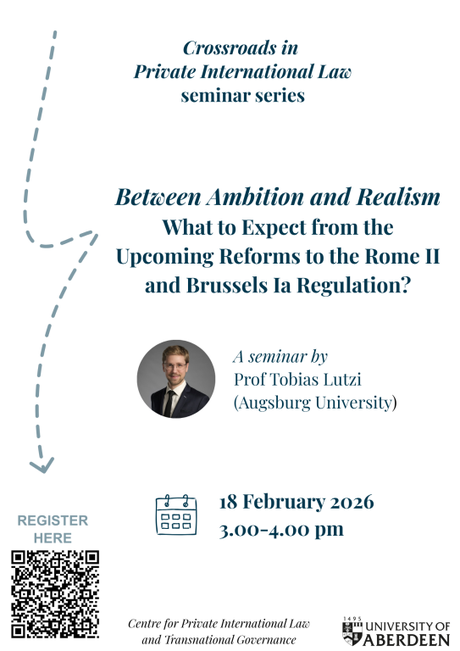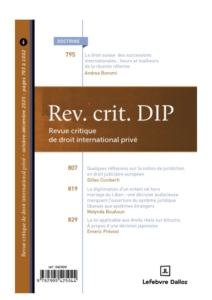Views
Online Symposium on Recent Developments in African PIL (IV) – Party Autonomy, Genuine Connection, Convenience, Costs, Privity, and Public Policy: The Kenyan High Court on Exclusive Jurisdiction Clauses

As part of the second online symposium on recent developments in African private international law, we are pleased to present the fourth contribution, kindly prepared by Anam Abdul-Majid (Advocate and Head of Corporate and Commercial Department, KSM Advocates, Nairobi, Kenya) and Kitonga Mulandi (Lawyer, KSM Advocates, Nairobi, Kenya), on Party Autonomy, Genuine Connection, Convenience, Costs, Privity, and Public Policy: The Kenyan High Court on Exclusive Jurisdiction Clauses
Online Symposium on Recent Developments in African PIL (III) – Foreign Judgments in Mozambique through the Lens of the Enforcement of a Chinese Judgment: Liberal Practice in the Shadow of Statutory Rigidity


As part of the second online symposium on recent developments in African private international law, we are pleased to present the third contribution, prepared by Béligh Elbalti (The University of Osaka, Japan), on Foreign Judgments in Mozambique through the Lens of the Enforcement of a Chinese Judgment: Liberal Practice in the Shadow of Statutory Rigidity.
From Deference to Objectivity: How Courts Are Rewriting the Commercial Reservation
By Taimoor Raza Sultan, Stockholm University
Introduction
The 1958 New York Convention (‘NYC’) is widely regarded as international arbitration’s most significant achievement. Having been ratified by over 160 states, , establishing a credible system of enforcement for arbitral awards. Yet the commercial reservation under Article 1(3), which allows the reserving state to limit the application of the ‘Convention only to differences …. considered as commercial’ under its own national law, risks jeopardizing the uniformity of the convention. By domesticating the definition of commerciality, the reservation invites forum shopping and inconsistent enforcement. Read more
News
EAPIL Conference in Geneva from 18-20 June 2026: Registration open!
 From 18 to 20 June 2026 the European Association of Private International Law (EAPIL) will host its third biannual conference. Following the Association’s conferences in Aarhus (Denmark) and Wroclaw (Poland) the conference promises to be a key event for scholars and practitioners interested in the present and future of European private international law.
From 18 to 20 June 2026 the European Association of Private International Law (EAPIL) will host its third biannual conference. Following the Association’s conferences in Aarhus (Denmark) and Wroclaw (Poland) the conference promises to be a key event for scholars and practitioners interested in the present and future of European private international law.
Programme and Audience
Under the title “Shaping the Future of Private International Law in Europe – Putting Together the Pieces & Filling Gaps”, the conference will address structural developments, unresolved issues, and emerging challenges in European private international law. Special emphasis will be placed on 1) the consolidation of European private international law in a single instrument (EuPIL Act), 2) the unification of international property law (including the protection of cultural objects), and 3) the relationship of European Private International Law with third States.
All topics will be addressed from an analytical and a forward-looking perspective, combining doctrinal reflection with policy-oriented debate. Contributions will come from an internationally diverse group of speakers, reflecting EAPIL’s commitment to comparative and transnational perspectives.
The conference is open to academics, judges, practitioners, policymakers, and early-career researchers with an interest in (European) private international law.
Venue and Organisation
Hosted by the Faculty of Law of the University of Geneva, the conference will take place exclusively in person in Geneva. The choice of venue underscores the international outlook of the event and provides an ideal setting for scholarly exchange and networking.
Registration
Registration is available here. An early-bird rate applies until 15 March 2026, with standard registration available until 17 May 2026. Participation fees vary depending on registration date and include the option to attend the conference dinner. Further details on fees and registration can be found on the conference website.
Why Attend?
The EAPIL Conference 2026 offers a unique opportunity to:
- engage with cutting-edge research in private international law,
- discuss current reform projects and unresolved doctrinal questions,
- connect with leading scholars and practitioners from across jurisdictions, and
- contribute to shaping the future development of the field.
Further Information
More information on the programme, registration, and practical details is available on the conference website.
About EAPIL
The European Association of Private International Law was founded in 2019 to promote the study and development of Private International Law. It has today more than 600 members from more than 70 countries. For more information visit the EAPIL website and follow the EAPIL blog.
Crossroads in Private International Law Webinar with Tobias Lutzi on “Crossroads in Private International Law Seminar on the Reform of EU Private International Law” at the University of Aberdeen
The Centre for Private International Law & Transnational Governance of the University of Aberdeen is continuing its Crossroads in Private International Law webinar series with a talk by Tobias Lutzi (University of Augsburg) titled ‘Between Ambition and Realism – What to Expect from the Upcoming Reforms to the Rome II and Brussels Ia Regulation?’:
The Centre for Private International Law & Transnational Governance invites you to attend the next seminar in our Crossroads in Private International Law seminar series. You can find the link to register at the bottom of this page.
Prof Tobias Lutzi (Junior Professor for Private Law at Augsburg University) will give a seminar on the reforms to the Rome II and Brussels Ia Regulation. Prof Lutzi has kindly provided the following abstract:
Last year, the EU Commission formally kicked off the process of reforming two key instruments of EU Private International Law, identifying potential areas for reform and setting out some overarching policy goals. In 2026, the Commission will face the more difficult decision of which of those areas to actually focus on. This talk will discuss the respective merits of those areas of reform, highlighting the tension between ambition and realism that will shape the Commission’s work.
We are looking forward to welcoming you online or on campus!
Additional information and the link to register can be found here.
Revue critique de droit international privé – Issue 2025/4
Written by Hadrien Pauchard (assistant researcher and doctoral student at Sciences Po Law School)
The fourth and last issue of the Revue Critique de droit international privé of 2025 has just been released. It contains four articles, eight case notes, and six book reviews. In line with the Revue Critique’s policy, the doctrinal part will soon be made available in English on the editor’s website (for registered users and institutions). Read more



